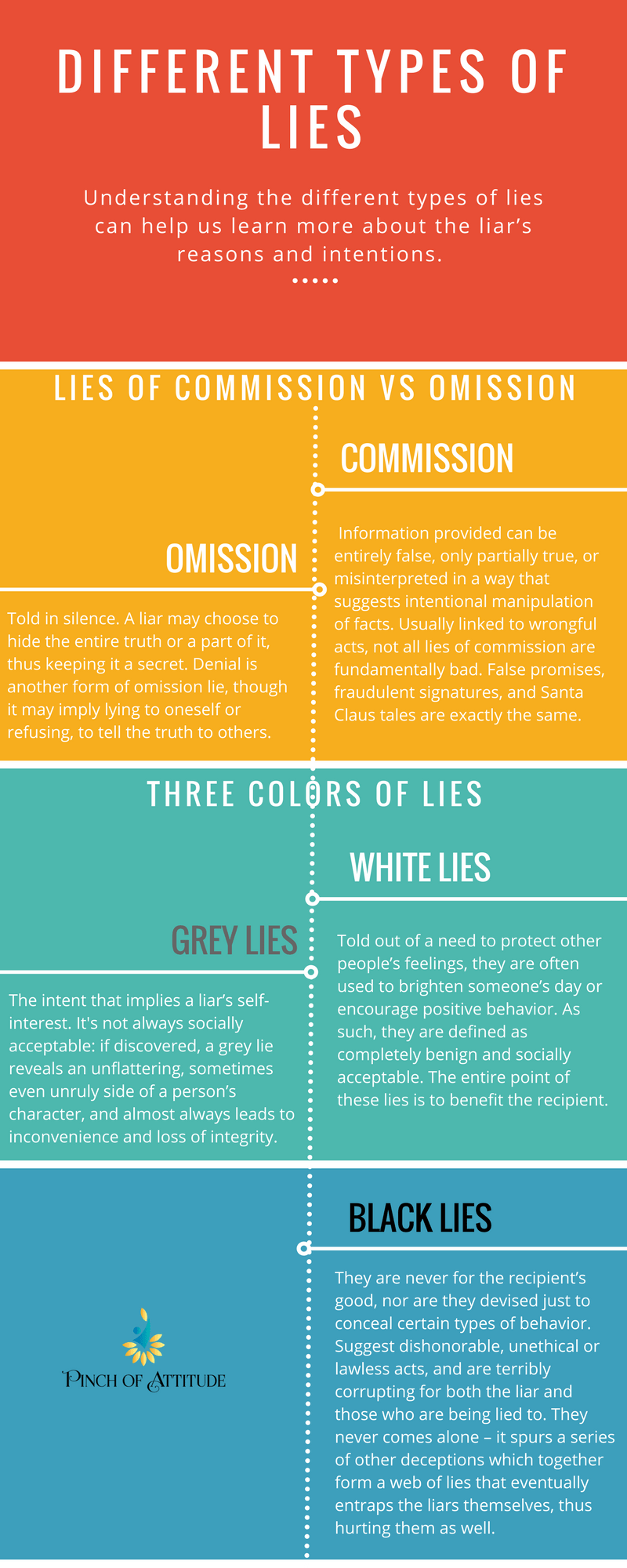They say, “Tell a lie once, and all your truths become questionable”. But, isn’t it true that everyone lies? Be that good-natured dishonesties and harmless tricks, or carefully fabricated deceits and blatant frauds, distorted truths are so deeply intertwined with the human nature that we cannot but ask: why do people lie?
Table of Contents
Why Do People Lie?

By definition, lying is saying something with the intent of creating a false belief or impression, an attempt to get someone to believe something that is not true. Still, that doesn’t exactly answer our question.
So why do people lie? It is because they are fundamentally evil?
Is inflicting pain upon others the real intent, or is it perhaps a need to be perceived in a different and better light?
If you too tell an occasional lie (and we all do, whether we admit it or not, now that is a different story), does that mean that there’s something wrong with you?
For the time being, let’s remember that every individual is an endlessly complex psychological system. It’s safe to assume that people lie for many various reasons, but shouldn’t we then begin by asking a different question: are all lies the same?
Are All Lies the Same?
Lies can be utterly simple, spoken in the spur of the moment and without any planning. They can also be thoughtfully constructed, complicated and premeditated. This difference alone is enough to determine that not all dishonesties weigh the same.
Sometimes, though, unintentional lies cause more damage than intentional ones. Premeditated or not, lying can hurt both the liar and the one being lied to. Vicious cycles in which one dishonesty is covered up with yet another are very frequent and extremely destructive.
Then again, some lies we tell without any conscious thought. It’s either that we don’t realize that our interpretation of the fact is untrue, or that we’ve developed a habit that we’re not aware of.
Nevertheless, consequences can be harmful in both cases.
 Other Forms of Lying
Other Forms of Lying
Still, not everything in lying is black and white. Sometimes, we unconsciously or deliberately enhance and beautify the truth.
For instance, exaggeration can hardly be classified as a benign lie, since it can potentially do harm; the damage it causes, however, depends on the very circumstance. The same applies to broken promises.
But, if there isn’t any concrete intention behind these lies, then why do people lie? Why is it so hard for them to resist the temptation? Every man is an island, as we’ve mentioned before, and there will always be those whose deceptions are solely psychological.
Rather than being white or black, compulsive lies are a symptom of a serious mental disorder that requires professional treatment.
The Intent to Deceive and Other Core Reasons
With all this in mind, we’re finally a step closer toward the answer to our question. People often say that they prefer a painful truth over a comforting lie, so here it is. The conclusion may not be pleasant, but it is a fact.
The conclusion may not be pleasant, but it is a fact.
Protecting Others
White lies are the best example of mistruths told out of the need to protect others, but they are not the only one. There are times in which we are compelled to keep secrets, deny the truth or deceive because it is the only way of protecting those we hold dear, even at the cost of hurting somebody else.
Protecting Oneself
If we’re being unselfish, we might say that the root of all other lies is our instincts to protect ourselves from harm. But, such lies are destructive nonetheless. Being potentially detrimental to others around a liar, they are selfish by definition. When we lie to avoid punishment, there’s always a risk of inflicting pain.
Personal Gain
Quite disturbingly, some people lie out of a sheer need to take what is not rightfully theirs, to gain an advantage or to exploit others. The personal gain doesn’t only have to be material, though. Lying to assume the role of a victim is a common technique of emotional vampires and implies a psychological gain.
Pathology
That leads us straight to our fourth reason. Compulsive liars have many different motives, and their fabrications can be triggered by either low self-esteem or malicious intents. These lies are sometimes told with the purpose of attracting sympathy, and sometimes, unfortunately, simply to hurt others.
Why Do Men Lie?

Truth builds trust, and both are essential for healthy and functioning relationships.
Traditionally, women are deemed as better liars than men; a person who despises women would now remind you that the female nature is pathologically manipulative as well. But, men lie too, and not always for a bad reason.
Avoiding Drama
There’s one thing nobody can deny – women rarely separate reason from emotions, which isn’t necessarily a bad thing. Justifiably or not, their sentiment usually turns disagreements into arguments, which men prefer to steer clear of. According to the stronger sex, avoiding drama is the number one reason men lie to their partners.
Protecting their Partner’s Feelings
The second reason is the one we’ve already talked about. Men consciously put themselves in a position of a pack leader, and with a quite noble intention: to protect their females. That’s why men are the true masters of flattering, which is nothing but another form of white lies.
Insecurity
Often enough, men lie about their jobs, hobbies, and interests. It’s interesting that this type of lie isn’t solely directed at the fairer sex, but guy friends, colleagues and acquaintances as well. Told out of the need to impress others, these lies are mostly a consequence of insecurity issues.
Why do Women Lie?

The above-mentioned statement about women being more prone to lying than men is not a sexist misconception.
According to a recent survey, they are twice as likely to lie as their partners! Is it simply the matter of women being more gossipy, or is it something else?
One of the often-noted distinctions between male and female brains concerns our use of language.
While linguistic processes occupy the left hemisphere in men, a woman’s brain handles these operations across both sides:
“The result of this may be that it’s often easier for females not only to read the effects of speech on others but also to tailor their own speech to bring about the best possible reaction: in other words, to tell people what they want to hear.”
While this scientifically explains why women are more frequent liars and prove that they are, in fact, better at this “art” than men, female reasons for distorting the truth are no more different than the male ones. The only notable one lies in the fact that, quite naturally, they perceive themselves as their partners’ opposites.
This means that, just as men are innately inclined to lie out of a need to protect, women often tell mistruths because they are afraid of making themselves vulnerable.
Be that a lack of trust or a necessity to keep the upper hand, the principal purpose of female lying is a power dynamic between two sexes that urges women to protect themselves even when they are not endangered.
Habitual Lying and Low Self-Esteem

Otherwise known as pseudologia fantastica, pathological lying and mythomania, the compulsive lying syndrome can be developed for many different reasons.
In some individuals, it is a consequence of maladaptive traumas, where lying is a habit established very early in one’s childhood.
In all other cases, when this condition is developed in adulthood, habitual lying is considered a consequence of low self-esteem.
Feeling compelled to improve their self-image in any way possible, extremely insecure people tell lies that present them in a better light.
Identifying a pathological liar is not hard. An individual with low self-esteem is tortured by feelings of low self-worth, which is why he or she displays an obsessive need for the positive feedback. That’s why they mostly devise unbelievable stories and tell lies to garner approval and acclaim.
Though such habitual lies come in many different forms, their purpose is always the same: to bring attention to the liar, to show them as a victim of other people’s hurtful behavior or unfortunate circumstances and thus compensate for their lack of accomplishments, or simply to make them look better.
How to Deal With a Liar?

Quite frankly, the only way to deal with a liar is to understand them.
That’s why learning why people lie is of such great importance. How you approach one depends on how involved you are emotionally and whether or not you want to help.
Always confront liars you love, but never forget to keep yourself protected from those you’re not so fond of.
1. Confronting a Liar at Home
If you’re being constantly lied to by a member of your family, be careful with your steps. This person most certainly means a world to you, and the aftermath of calling a liar out is never pleasant.
You want the best for both them and yourself, so avoid humiliation and take a more calculated approach.
2. Children
Lying is not unfamiliar to children, but that doesn’t mean that you should let the lie pass unnoticed.
This is the time to teach your kids the value of truth-telling, which is something they will hold on to for the rest of their lives.
Always listen to what lies beneath.
The best way to determine the core issue is to establish a safe haven in which nobody is close-minded or judgmental.
Children mostly lie out of shame or fear, so consider their developmental age before you decide how to respond and act.
You should be the one they trust the most to say or tell anything to which all parents should be. Inserting fears to kids is one of the most damaging things you can do.
Explain the difference between unjust punishment and just repercussion. It’s important to stress that no truth can remain hidden for long, and that lies always yield consequences.
Don’t be afraid to be vulnerable: use an example from your personal experience to illustrate this, since that’s the best way to teach children.
3. Partners
Together with mutual respect and understanding, honesty is a building block for fulfilling romantic relationships. That’s why there’s no space for lies between partners in life, and why mistruth can feel like a serious form of betrayal.
Exactly because of the aforementioned reasons that so often tempt women and men to lie to each other, examining how you would have reacted to the truth is a helpful trick.
For instance, what do you usually do when your partner is honest about spending time with his or her friends? And why?
If you tend to exaggerate problems and blow things out of proportion, it may be the time, to be honest with yourself.
If this is not a case, then open communication is your only course of action. Share your feelings and concerns and, if need be, consider seeking professional advice.
4. Confronting a Liar in the Office
Like politics, the business world is often full of deceivers. If there’s a liar among your company midst, there’s actually a lot you should consider before taking a stand.
Even when the lies told are not against the protocol, they can seriously cause a disturbance in the force and harm your office dynamic.
Once again, be careful. Think about how severe your employee’s or colleague’s dishonesties actually are and whom they can potentially affect and in which way. Depending on this, you can choose to do nothing or to confront the person in question.
If you decide to do the latter, don’t be impulsive about it. Try to handle the situation privately and offer help if needed. Always equip yourself with evidence of their wrongdoing; otherwise, don’t be surprised if your good intentions backfire and some claims are raised against you instead.
How to Stop Lying?

Here’s a nice quote by Mark Twain “If you tell the truth, you don’t have to remember anything”.
Since you are reading this, it is safe to assume that you’ve acknowledged your problem, and are painfully aware of the harm you’ve caused to others around you.
Stay brave, and read on.
1. Identify the Root of the Problem
Think about how, when and why you’ve started being dishonest. What is it that you actually want to hide?
Lying is a form of addiction as well, which is why you need to approach it like any other. If you can’t think you can do it on your own, reach out to family and friends.
2. Keep a Reminder
There’s a good chance you’ve chosen to forget how you’ve felt when one of your lies caused pain to someone, but try to recall it anyway. Keep it as a reminder of how habitual lying destroys relationships and burdens your consciousness.
3. Confess and Explain
If it happens again, don’t let it drag you back into the vicious cycle. Admit that what you’ve said was false, explain that lying is a problem you’re currently working on, and make amends. Even if the person you’ve lied to refuses to understand and help you, you’re on the right path.
4. Don’t Promise What You Can’t Deliver
It’s never easy to admit that you can’t do something, especially if the commitment you’ve made is for the greater good. But, keep in mind that our limitations can never hurt those we love as much as broken promises.
5. Work on Your Self-Esteem
Your habitual lying most probably comes from your insecurities, which is why you need to start working on your self-esteem as well. Talk to family and friends about how they see you and what they expect from your behavior, and be open about your limitations.
Uncross The Fingers
Whether expressed with words or uttered in silence, lies stand on our way to live a genuine, fulfilling life. In the end, we’re all in a never-ending pursuit of meaning. Though truth sometimes hurts, it’s never for long. Lies, on the other hand, scar those who have been lied to forever.



